"Classical nuclear deterrence has been faltering, which necessitates revisions to our nuclear doctrine. We hope that Washington, other NATO capitals, and military planners in Brussels will pick up on the deterrence cues from our work," the senior Russian diplomat said in an interview with the Serbian newspaper Politika.
According to Ryabkov, Russia has been working to review the fundamentals of its state policy in the field of nuclear deterrence based on its experience in the special military operation and all things "associated with the rampant support to the Kyiv regime from its Western patrons."
"We are not seeking a wider war, but we will not tolerate unending attacks on the basic security issues of Russia and the Russian people," the diplomat concluded.
On September 25, Russian President Vladimir Putin announced some changes to Russia’s nuclear doctrine at a permanent meeting of the Security Council. Among other things, the doctrine revisions stipulate that Russia will now recognize support of a non-nuclear state at war with Russia by a nuclear power as an attack, and they allow for a nuclear response to an attack on Russia’s ally — Belarus. The revised doctrine also expands the range of countries and military alliances subject to nuclear deterrence, as well as the list of military threats that such deterrence is designed to counter.
MNA/PR

























Your Comment